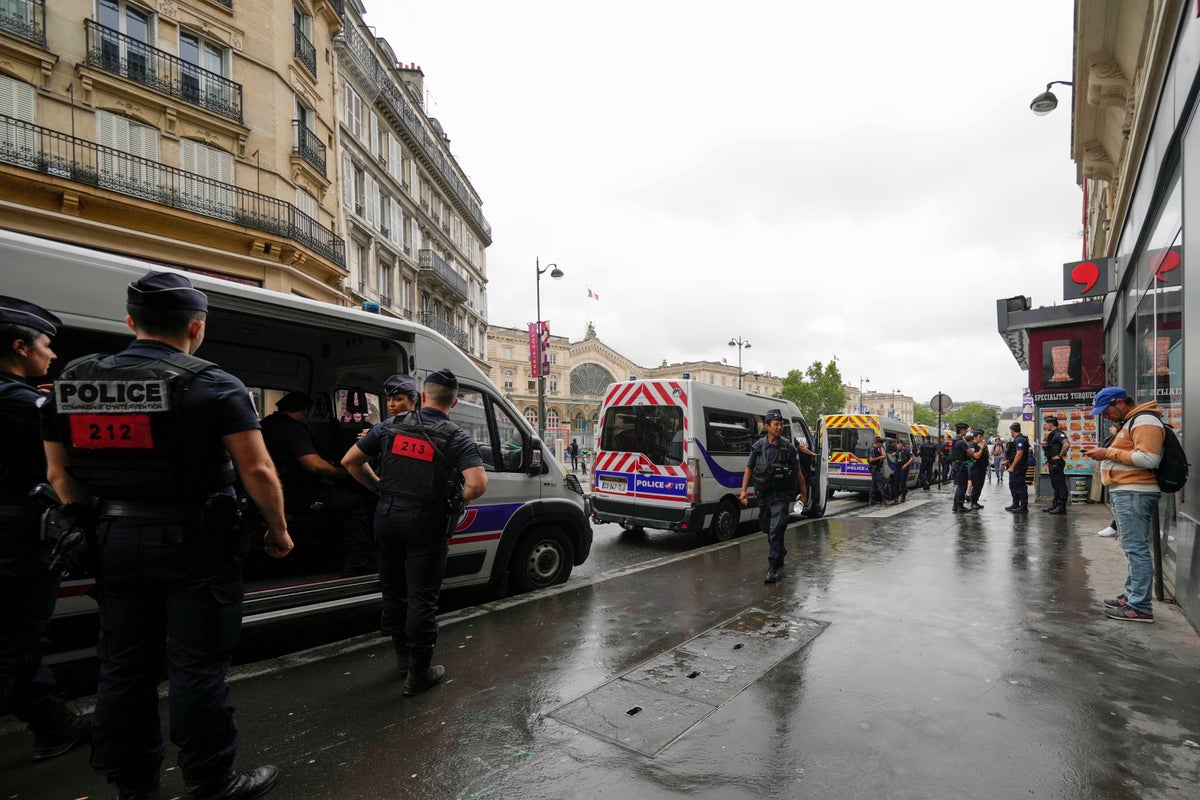
Support truly
independent journalism
The Paris Olympics were getting off to a rougher than hoped-for start Friday, with suspected acts of sabotage targeting France's flagship high-speed rail network and cloudy skies with light drizzle over the French capital ahead of its sprawling, ambitious opening ceremony.
On a day of utmost importance for France and its capital, with dozens of heads of state and government in town for the Olympic opening and a global audience of over 1 billion expected to tune in, authorities were scrambling to deal with widespread rail disruptions caused by what they described as coordinated overnight sabotage of high-speed train lines.
Overcast skies over Paris further dampened the mood. Together, service delays in Paris train stations and drizzly weather underscored potential vulnerabilities of the bold decisions to break with Olympic traditions and stage an opening ceremony like no other.
By turning the whole of central Paris into a giant open-air theater for the ceremony that starts at 7.30 p.m., Paris organizers have bigger crowds to transport and safeguard than would have been the case if they'd followed the example of previous Olympic host cities that opened in stadiums.
And while damp weather shouldn't derail the ceremony and its many planned surprises, Paris organizers had been crossing fingers for good natural lighting and clearer skies to assist with their vision of showcasing the city and its iconic monuments.
National weather service Meteo France forecast evening rains. Wet weather would make the ceremony more fatiguing experience for the thousands of Olympians on open barges and fans on the banks and bridges. The athletes will parade on boats along the River Seine before they embark on the next 16 days of competition.
The ceremony “was thought out so it can be held in the rain,” said the Paris Games’ chief organizer, Tony Estanguet, speaking to France Inter radio.
“It will perhaps be a bit different,” he added. “We'll adapt.”
Still, Paris still has plenty of aces up its sleeve. The Eiffel Tower, its head still visible below the clouds, Notre Dame Cathedral — restored from the ashes of its 2019 fire — the Louvre Museum and other iconic monuments will star in the opening ceremony. Award-winning theater director Thomas Jolly, the show’s creative mind, has used the signature Paris cityscape of zinc-grey rooftops as the playground for his imagination.
His task: Tell the story of France, its people, their history and essence in a way that leaves an indelible imprint on the Olympics' global audience of billions. Refresh the image and self-confidence of the French capital that was repeatedly struck by deadly extremist attacks in 2015. Capture how Paris is also aiming to reboot the Olympics, with Summer Games it has worked to make more appealing and sustainable.
It's a big ask. So Paris is going big, very big. That goes for the security, too. Large fenced-off stretches of central Paris are locked down to those without passes and the skies during the ceremony will be a no-fly zone for 150 kilometers (93 miles) around.
Many details of the ceremony that will stretch through sunset and into the Paris night remain closely guarded secrets to preserve the wow factor. French media have mentioned Lady Gaga, Céline Dion and stars from France as possibles among the thousands of performers. Jolly was also recently filmed watching French air force jets practicing how to draw a heart in the Paris skies with trails of colored smoke.
Soccer icon Zinedine Zidane, who led France to World Cup ecstasy in 1998, is among guesses for who might light the Olympic cauldron. Another suggestion is that organizers might bestow that honor on survivors of attacks in and around Paris on Nov. 13, 2015, by Islamic State-group gunmen and suicide bombers who killed 130 people.
The ceremony's broad-brush strokes, however, have been previously announced and are stunning in their ambition. French President Emmanuel Macron said they initially felt like “a crazy and not very serious idea.”
The athletes will board boats and parade on an east-west route along a 6-kilometer (nearly 4-mile) stretch of the Seine. Watching will be 320,000 paying and invited ticket holders, plus many from balconies and windows. Before the latest forecast of evening rains, Paris organizers said they expect 6,800 of the 10,500 athletes will attend.
On the athletes' waterborne adventure, Paris' splendors will unfurl before them. They'll pass historic landmarks that have been temporarily transformed into arenas for Olympic sports.
Concorde Plaza, where French revolutionaries guillotined King Louis XVI and other royals, now hosting skateboarding and other sports, and the Grand Palais of iron, stone and glass, the fencing and taekwondo venue.
The golden-domed resting place of Napoléon Bonaparte, the backdrop for Olympic archery, and the Eiffel Tower, which donated chunks of iron that have been inlaid in the gold, silver and bronze Olympic medals. They'll be won in the 32 sports' 329 medal events.
Up to 45,000 police and gendarmes, plus 10,000 soldiers, will safeguard the ceremony and its VIP guests, with IOC President Thomas Bach and Macron presiding.







